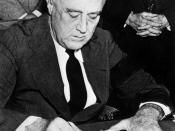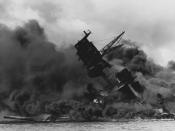In the early morning hours of September 1, 1939, the German armies marched into Poland. On September 3 the British and French surprised Hitler by declaring war on Germany, but they had no plans for rendering active assistance to the Poles.
The Battle of Britain
In the summer of 1940, Hitler dominated Europe from the North Cape to the Pyrenees. His one remaining active enemy--Britain, under a new prime minister, Winston Churchill--vowed to continue fighting. Whether it could was questionable. The British army had left most of its weapons on the beaches at Dunkirk. Stalin was in no mood to challenge Hitler. The U.S., shocked by the fall of France, began the first peacetime conscription in its history and greatly increased its military budget, but public opinion, although sympathetic to Britain, was against getting into the war.
The Germans hoped to subdue the British by starving them out. In June 1940 they undertook the Battle of the Atlantic, using submarine warfare to cut the British overseas lifelines.
The Germans now had submarine bases in Norway and France. At the outset the Germans had only 28 submarines, but more were being built--enough to keep Britain in danger until the spring of 1943 and to carry on the battle for months thereafter.
Invasion was the expeditious way to finish off Britain, but that meant crossing the English Channel; Hitler would not risk it unless the British air force could be neutralized first. As a result, the Battle of Britain was fought in the air, not on the beaches. In August 1940 the Germans launched daylight raids against ports and airfields and in September against inland cities. The objective was to draw out the British fighters and destroy them. The Germans failed to reckon with a new device, radar, which greatly increased the...



You are a god
hello you are my god
4 out of 4 people found this comment useful.